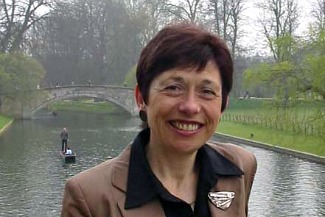"I don't want to be chosen for a job because I happen to have been born with an extra X chromosome"

Patricia Fara is an expert on women in science and science in the Enlightenment. She is Senior Tutor and Director of Studies in History and Philosophy of Science at Clare College, and an Affiliated Lecturer in the History and Philosophy of Science Department at the University of Cambridge. Some of her main publications are Pandora’s breeches: women, science and power (London: Pimlico, 2004), Sex, botany and empire: the stories of Carl Linnaeus and Joseph Banks (Duxford: Icon Books, 2003) and Newton: the making of genius (London: Macmillan, 2002). Her latest book is Science : A four thousand year history (Oxford: Oxford University Press, 2009), translated into Spanish as Breve historia de la ciencia (Barcelona: Ariel, 2009). Patricia Fara visited UAB as a guest at the CEHIC, where she gave a lecture called "Ghosts of Women Past".
Why do you believe that knowing about the past of women in science can help make the present better?
As an academic, my major strategy for achieving change is to increase understanding.
I can’t be certain that learning about earlier attitudes will have any impact on modern society, but for me, the whole point of doing history is to see how the past has affected the present and use that awareness to improve the future. By reflecting on the position of women in previous centuries, I aim to encourage my audiences to think more carefully about their own behaviour and opinions, and not just perpetuate the prejudices they were brought up with. Transforming society is inevitably a slow process, but small local actions can have a large cumulative effect: I feel that if I succeed in influencing only a few people, that is still better than doing nothing. One of my favourite books is George Eliot’s Middlemarch, which she ends by commenting that “…the growing good of the world is partly dependent on unhistoric acts; and that things are not so ill with you and me as they might have been is half owing to the number who lived faithfully a hidden life, and rest in unvisited tombs.”
What was life like for women who wanted to do science in the past?
That’s an enormous question, partly because science itself was very different from what it is now. For any individual woman, life depended heavily on the men around her. If she was lucky enough to have a rich and enlightened father or husband, then she was in a position to pay for personal tuition and could afford to buy any instruments she needed. If she was born into a scientific family, then she was still more fortunate, especially before the mid-nineteenth century, when experimental work was still carried out at home rather than in large laboratories. Moreover, the boundary between domestic and scientific activities was blurred, so that a woman in charge of a large household might be responsible for dispensing medicines, trying out different crops, preserving food, making soaps and perfumes – all activities that could now be seen as scientific.
What was the profile of this kind of woman?
Just as there is no one single type of modern female scientist, so too, in the past, women who practiced science varied enormously. Some of them colluded in their own subservience, happy to carry out menial tasks for the men in their family. Others were fiercely independent, determined to overcome the educational limitations imposed upon them. Many fell between those two extremes, recognizing that not all doors were open to them, but pragmatically choosing the routes that were feasible – collaborating behind the scenes with scientific men, or collecting, illustrating and classifying specimens. In particular, the crucial tasks of translating, interpreting and teaching were often undertaken by women, who found this type of work compatible with looking after a husband and children.
Do you think we carry a burden from the past in our present attitudes?
Yes, of course. But I don’t want to make a unique case for women: many other groups of people are still treated differently because of gross discrimination in the past. The white male intellectual hierarchy that pervaded Western Europe affects modern attitudes towards ethnicity, class, religion and disability as well as towards gender.
How do you see women in science now? And their future?
The problems affecting women in science are common to those in many other professional careers. Quite clearly, there is far less overt discrimination than there used to be, and the numbers of women at top levels are slowly creeping up. Rather than seeing women as the victims who are being excluded, I prefer to think about women making positive choices. Perhaps they don’t want to be at the head of a large organization? Instead of working 24/7, they prefer to have spare time for hobbies, holidays and families, and have no desire to spend their whole life in an office or laboratory. Rather than competing to exhibit more masculine behaviour than their male colleagues, some modern women are aiming to create a more balanced society that is not dominated by obsessive workaholics.
What do you think of the “female quota” in institutions and senior positions?
Like most of my female friends, I am totally opposed to quotas. I want to be confident that I’ve been chosen for a job because I’m the best candidate, not because I happen to have been born with an extra X chromosome. Imposing quotas can often result in inferior women being picked, which can only contribute to women being held in low esteem and discriminated against.
Àrea de Comunicació i Promoció de la UAB

